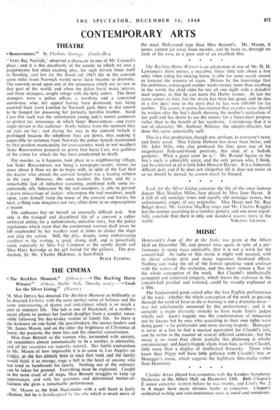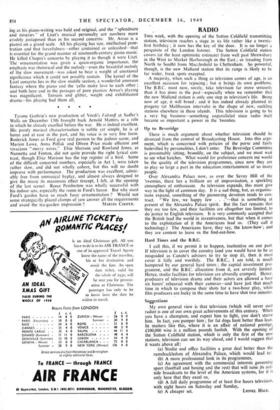MUSIC
HONEGGER'S Joan of Arc at the Stake was given at the Albert Hall on December 7th, and proved once again, in spite of a per- formance in many ways admirable, that it is not a work for the concert-hall. As radio or film music it might well succeed, with its clever eclectic style and many ingenious theatrical effects. Nothing can make the oil of the human speaking voice coalesce with the waters of the orchestra, and this must remain a flaw in the whole conception of the work. But Claudel's intellectually prompted and contrived imagery, which leaves the audience in the concert-hall puzzled and irritated, could be visually explained in a film.
The fundamental point raised after the first English performance of the work—whether the whole conception of the work as passing through the mind of Joan as she is burning is not a dramatic error— was not satisfactorily answered by this performance ; and it is certainly a major dramatic mistake to have made Joan's judges wholly evil. Joan's tragedy was the condemnation of innocence not by knaves but by men who according to their own lights were doing good—a far profounder and more moving tragedy. Honegger is never at a loss to find a musical equivalent for Claudel's text, and he writes in the manner of several different centuries ; but the music is no more than clever pastiche (his plainsong is wholly unconvincing), and Joan's tragedy elicits from him, as from Claude!, little more than a display of intellectual fireworks. Those who know their P6guy will have little patience with Claudel's text or Honegger's music, which suggests the highbrow film-studio rather than Domr6my Claudio Arran played two concertos with the London Symphony Orchestra at the Albert Hall on December 11th. Both Chopin's E minor concerto. written before he was twenty, and Liszt's No. 2 in A major have many obvious faults as concertos. Chopin's orchestral writing and instrumentation were as timid and unintcrest-
ing as his piano-writing was bold and original, and the " splendours and miseries" of Liszt's musical personalty are nowhere more crudely juxtaposed than in his second concerto. Mr. Arrau is a pianist on a grand scale. All his playing has size, intellectual pene- tration and that forcefulness—either contained or unleashed—that is essential for the grand manner of nineteenth-century piano music. He killed Chopin's concerto by playing it as though it were Liszt. The ornamentation was given a quasi-organic importance, the emphasis was rhetorical and the melody—even the beautiful melody of the slow movement—was asked to bear a weight of emotional significance which it could not possibly sustain. The kernel of the Liszt concerto lies in the slow middle section, a wonderful amorous fantasy where the piano and the 'cello make love to each other ; and both here and in the passages of pure pianisni Arrau's playing was magnificent. Tension and glitter, weight and exhibitionist drama—his playing had them all.
Tyrone Guthrie's new production of Verdi's Falstaff at Sadler's Wells on December 13th brought back Arnold Matters in a role in which he already excelled before the war. He is indeed excellent. His purely musical characterisation is subtle yet simple, he is at home and at case in the part, and his voice is in very fine form. Roderick Jones as Ford gave real passion to the jealous scene, and Marion Lowe, Anna Pollak and Olwen Price made efficient and vivacious " merry wives." Elsie Morison and Rowland Jones, as Nannetta and Fenton, did not quite provide the right lyrical con- trast, though Elsie Morison has the top register of a bird. Some of the difficult concerted numbers, especially in Act I, were taken rather slow, and did not wholly cohere, but this will no doubt improve with performance. The production was excellent, admir- ably free from unmusical byplay, and almost always designed to give the music its maximum effect (except, I felt, at the opening of the last scene). Reece Pemberton was wholly successful with his indoor sets, especially the room in Ford's house. But why must Ford's garden have so much fussy ornamentation ? Would not some strategically placed clumps of yew answer all the requirements
and avoid the tea-garden impression ? MARTIN COOPER.



































 Previous page
Previous page